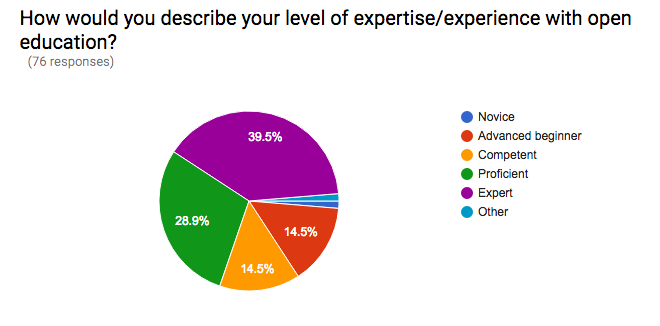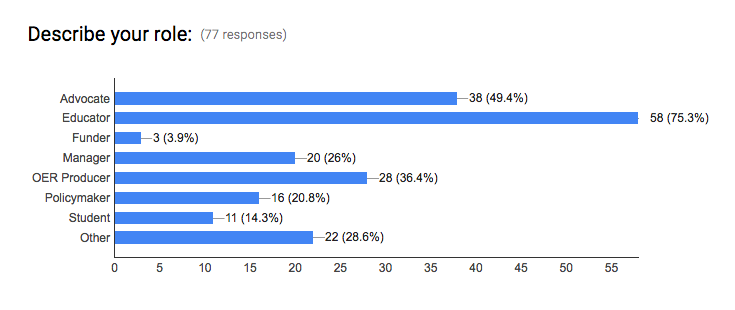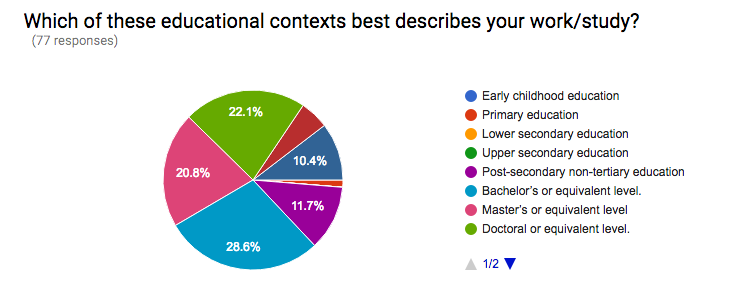
The Open Research Agenda
Tomorrow afternoon we will conduct a webinar to discuss the results of an OER Hub research consultation exercise. What follows below is a summary of the latest data that has been received, and is reproduced from OER Hub so that participants can easily find it.
You can read more about the background to the consultation at http://oerhub.net/collaboration-2/the-open-research-agenda-1/.
Join the OER Hub team for the webinar at GMT+1/BST 1600 via https://oufm.open.ac.uk/fm/272e36-6006
Back in March OER Hub shared the preliminary results of our consultation exercise we are calling The Open Research Agenda. Since then we have presented these findings and run seminars at two major open education conferences – OER16 and Open Education Global.
[slideshare id=60910831&doc=20160414oeglobalbporagenda-160414120222]
[slideshare id=61140929&doc=20160420openresearchagenda-160420114650]
Future presentations will take place at the CALRG Annual Conference and at Open Education 2016, which will be the final presentation of the results of the consultation. This afternoon we will be discussing the results so far with members of the GO-GN network of graduate students working in OER research.
The purpose of this blog post is to summarise some of the diverse responses we have had to our invitation for different stakeholders to tell us what they think the most pressing research areas are for the OER community. Since writing the original post we have received an additional 44 survey responses, bringing us to a total of 77 responses from 31 countries. There will be future updates as we refine the data and our conclusions over the summer. In the meantime, please contribute!
The majority of those who completed the survey considered themselves to be either proficient or expert in OER. There were a very small percentage of respondents who self-described as ‘novice’.
We asked people to describe their role with the idea that we could perform some analysis to identify differences in trends according to role. This is complicated by the fact that many people told us they have multiple roles (e.g. many are educators in addition to having some other role). We saw a good range of educational sectors represented in the sample.
Key themes that are emerging
- Impact research: measuring the influence of the use of OER and OEP on learning outcomes and institutions; more studies that do not focus on textbooks;
- Understanding adoption and adaptation: factors affecting adoption of individual OER; qualitative descriptions of adaptation; barriers to remix and sharing (& implications for design); strategies for easing implementation by faculty’
- Open practice & pedagogy: citation and cataloguing protocols; integration of OER into curriculum; creating assessment tools; micro-credentialling and recognition of prior learning; sustainable business models; OER for lifelong learning and professional development; policy development; benefits of ‘non-disposable assignments’;
- Quality issues: peer review; co-operation between higher education institutes; importance of quality for education;
- Ethical issues: privacy, security and trust in online learning; ownership of (student) data and ‘safe spaces’; access & accessibility vs remixable resources;
- Technology and infrastructure: ways of cataloguing and sharing OER (e.g. shared database); linked open data for OER; open digital badging; geographical hubs for sharing OER; using OER with VLEs; beyond repositories; a sustainable OER ecosystem; interoperability
- ‘Openness’: social and political aspects of open education; quantifying the return on investment from going open; articulating the benefits of open; building open communities and supporting cross-community exchange; tension between differing interpretations of openness
Selected emerging research questions
- Does promoting, using and creating open educational resources really provide tangible benefits to students, teachers or institutions?
- [W]hat is the role of publishers in promoting or hindering open education? Also, what is the role of corporations (Google, Apple) and corporate charities (Bill Gates, Hewlett) in open ed promotion?
- What role to educational materials play in the whole teaching and learning process (central information source, mediation of teaching and learning, distraction of teaching and learning)? – ergo: why does changing educational materials to OER really matter?
- What is the social function of open education?
- How and to what extent does OER and OEP impact in student performance and retention?
- Does innovation in open learning widen the global knowledge gap?
- How can new publishing models be created which persuasively and sustainably support new forms of learning resources and scholarly provision ?
- Who is benefiting from the Open Education movement? Who is shaping the movement, what story is being told about Open Education and whose voice is not being heard?
- Whether current understandings of open education (dominated by the Western world/global north) are harming educational progress in the global south. I worry that the strict rules which have been created around ‘openness’, particularly around remixing, are in fact only benefitting those in the global north. I also don’t think that this is a question which can or should be answered by the OERHub, and indeed researchers working in the UK/US/much of Europe.
- Why is open education good for us? What is our role? How can we contribute? Do we also need to look beyond funding? How can we come up with sustainable solutions that grow naturally through community engagement?
- Does open education increase learning? Increase completion of courses? Increase likelihood of achieving a credential?
- I am interested in knowing more of who is driving the OER agenda and how this interacts with the drivers of mainstream educational institutions i.e. the power dynamics at play.
- How do we scale up and connect the different projects across the country & world to achieve a clearer and cohesive view?
- Are OER policies just meaningless statements that have no impact on actual educational practice and learning and teaching?
- How do instructional designers/faculty easily find high-quality material without sifting through hundreds of resources?
- How can we better encourage a two-way exchange for OER across languages and national borders? There are several international efforts that directly or tangentially deal with OER, including the Open Government Partnership, USAID, UNESCO and the UN Sustainable Development Goals. If there was a way to show evidence via a visual map of the overlap between the different initiatives’ goals, resources needed/used where available and contact info, we might be able to better collaborate.
- What is the added value of connecting different areas of open? Which policies to advance OE do really produce measurable results and in which contexts are they valid?
- How can we convince stakeholders of the value of opening up our education research?
In addition to the online consultation several areas of focus have emerged following discussions in person:
- Those working as advocates in open education and open access have expressed a need for very clear, well summarised evidence that can feed through to their efforts
- The issue of colonialism in open education was discussed, and there was a feeling that international co-operation and collaboration was a way of addressing this
- We need to understand the factors affecting conversion to open practice for different stakeholders (students/educators/policymakers)
- We need to understand the cultural, technological and pedagogical barriers to adoption
- We need institutional data which shows marked effect on student outcomes when using OER
- How can we demonstrate the importance of information literacy for open education?
We will update this data through a new blog post in a few weeks after the GO-GN webinar and presentation at CALRG. Look out for Part 3!





